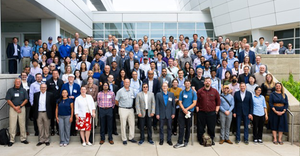RECYCLING: Teaching Zero Waste
May 1, 2002
Carol Badaracco and Toby Weitzel
Students at the San Diego Jewish Academy (SDJA) are taking playing in the dirt to a new level with their zero-waste and vermicomposting program.
Designed by San Diego-based Daily Remains, SDJA's program was created to help the kindergarten through 12th-grade Jewish community day school be "earth-friendly," according to Doug Reiss, SDJA's director of operations. The school resides in an environmentally sensitive wetlands area, he explains, so SJDA wanted to map out a plan to recycle, reuse and compost everything brought onto campus. If an item was not environmentally sustainable, it generally is omitted from school use.
To decide which items could not be reused or recycled, San Diego-based Daily Remains performed a waste audit to analyze what items were being thrown away. The company found that most items -- pens, pencils, aluminum cans, plastic water bottles, books and old furniture -- could be recycled or donated to local charities. The school also recognized that it could compost, or vermicompost, organic waste such as food waste, paper waste from bathrooms and classrooms, tree trimmings, and grass clippings.
For its vermicomposting system, SDJA chose the Toronto-based Vermitech System's V-200 unit, which is designed to handle up to 250 pounds of organic waste per day and includes an industrial grinder that reduces waste to ⅛-inch particle size before it is fed to the worms.
To further ease implementation of the waste reduction system, the school's infrastructure was specially designed. "We wanted to make sure we had the piping in place so that we could pulp waste nearest its source, and then deliver that pulped waste later to the vermi-bin," Reiss says. The school also set up 12 recycling centers where trash, cans, bottles, food and paper waste can be discarded.
Additionally, SDJA makes source separation and management of the program part of the school's curriculum. High school students spearhead an entrepreneurial recycling business, which helps them to learn the benefits of recycling, as well as how to run a business.
"The idea was to start a business [the students] could actually run, operate and make money on," Reiss says.
Younger grade levels are taught waste recycling values and methods, too. For example, "Even the kindergartners … take a field trip to see the worm bins and how the worms work, and how nature recycles," Reiss says.
Marrying zero waste with curriculum did come at a relatively hefty price tag. Total infrastructure costs, including all the necessary equipment for pulping and the vermi-bins, equaled more than $110,000 with installation.
However, Reiss adds, "We figured our pay-back was between seven and 10 years, based on both savings in hauling and in the production of goods."
One of the biggest challenges to get students on the recycling bandwagon is educating parents to help in the zero waste process.
"It's so ingrained for parents to send kids to school with convenience foods packaged in plastics," Reiss says. So to combat the"plastic" lunches coming into SDJA, the school came up with a lunchbox system composed of completely recyclable materials. Parents can place their children's food in the new recyclable box, which the school has been trying to sell as a fundraiser and as a way to reduce trash.
In the two years the SDJA program has been operating and striving to reach zero waste, Reiss says the school has actually reduced waste by nearly 85 percent. He believes that the program may reach 100 percent in the upcoming school year because SDJA has found someone to recycle white paper at no additional costs.
Based on the SDJA's experiences, Reiss offers words of wisdom to other institutions or businesses interested in implementing zero waste programs: "Expect that it's going to take a number of years because of the education process," he says. "It's not going to happen overnight."
For more information on the implementation of zero waste programs, visit Daily Remains at www.dailyremains.com or call (760) 439-4731.
You May Also Like


